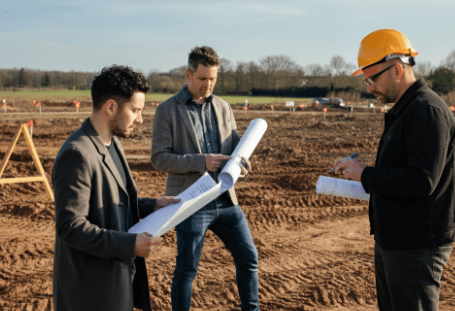Buying land for development can be a complex and rewarding investment. Whether you’re looking to create residential neighborhoods, bustling commercial centers, or expansive industrial zones, understanding the intricacies of the land acquisition process is crucial. This blog is designed to lead you through the essential steps in buying land for development, offering insights into the factors you need to consider for different projects. By the end of this guide, you’ll be well-equipped with the necessary knowledge to make informed decisions when buying land for development.
Real estate investors like Steve Daria and Joleigh have successfully navigated the complexities of land acquisition, turning promising plots into thriving developments. Their experiences underscore the significance of conducting comprehensive research and strategic planning in making profitable investments. By learning from seasoned professionals like Steve and Joleigh, aspiring developers can better understand the essential factors in purchasing land for various projects.
Understanding Land for Development
Before discussing buying land for development, it’s essential to understand that land for development holds significant potential for various construction projects, serving as the canvas for new structures and facilities.
Whether residential neighborhoods to accommodate growing populations, commercial spaces to support businesses, or industrial zones to drive economic activity, land earmarked for development plays an important role in shaping communities and meeting societal needs.
At its core, the concept of land for development embodies the transformation of raw, undeveloped land into valuable assets that contribute to economic growth and social well-being.

Critical Considerations for Buying Land for Development
Before diving into the development process, it’s crucial to consider several factors:
Location
The land’s geographic location significantly impacts its potential and value.
Proximity to amenities, transportation hubs, and economic centers can enhance a development project’s attractiveness.
Zoning Laws
Knowing local zoning laws and regulations is important.
These laws dictate what can be built on the land and its permissible uses.
Environmental Concerns
Environmental assessments may be required to ensure the land is suitable for development.
Factors such as soil quality, flood risk, and protected areas must be evaluated.
Market Demand
Assessing market demand helps determine the viability of a development project.
Engaging in market research yields valuable insights into what types of properties are in demand in a particular area.
Get Started: Get Your Cash Offer Below…
We are direct land buyers. There are no commissions or fees and no obligation whatsoever. Start below by sharing where your property is and where we can send your offer…
Strategies for Buying Land for Development
Buying land for development necessitates meticulous planning and precise execution. Here are some strategies to ensure success:
Conduct Thorough Due Diligence
Conducting thorough due diligence before purchasing land is important to mitigate risks and ensure a successful investment.
This comprehensive process involves researching and verifying all aspects of the property to uncover potential issues or liabilities that could affect its value or intended use.
From examining the property’s legal and ownership status to assessing environmental considerations, infrastructure availability, and market trends, due diligence provides buyers with the necessary information to make informed decisions.
Buyers can identify opportunities, negotiate effectively, and confidently invest by thoroughly evaluating the property’s suitability and potential risks.
Title Search: Ensuring Legal Clarity
Before finalizing any land purchase, conducting a thorough title search is crucial.
This process involves examining public records to verify ownership history and ensure no legal disputes or encumbrances on the property’s title.
A clear title is essential for securing financing and avoiding possible legal issues in the future.
Hiring a professional title search company or real estate attorney can help navigate this complex process and provide peace of mind to the buyer.
Surveying Boundaries: Defining Property Limits
A land survey is critical in land-buying, especially for undeveloped parcels or properties with unclear boundaries.
A licensed surveyor will measure and map the land, identifying property lines, easements, and any encroachments from neighboring properties.
This information is vital for ensuring that the buyer understands the exact dimensions and layout of the land they are purchasing and for resolving any boundary disputes that may arise in the future.
Environmental Assessment: Ensuring Safety and Compliance
Environmental assessments are essential, particularly for land intended for development.
These assessments evaluate the property for potential environmental hazards, contamination, or sensitive habitats that may impact future construction or land use plans.
Conducting an ecological assessment helps buyers understand any remediation or mitigation measures that may be necessary and ensures compliance with environmental regulations.
Working with ecological consultants or agencies can provide valuable insights into the land’s suitability for development and help mitigate risks associated with environmental liabilities.
Create a Comprehensive Development Plan
A well-thought-out development plan is crucial for securing financing and obtaining necessary permits:
- Conceptual Design: Outline the vision for the development project, including architectural designs and layouts.
- Feasibility Study: Assess the project’s economic viability by analyzing costs, potential revenue, and ROI.
- Permitting: Acquiring all required permits and approvals from local authorities.

Secure Financing
Financing is a critical component of any development project:
- Traditional Loans: Banks and financial institutions offer loans specifically for land development.
- Private Investors: Seek investment from private investors interested in real estate projects.
- Crowdfunding: Make use of crowdfunding platforms to raise capital from multiple investors.
Assemble a Skilled Team
A successful development project needs a team of professionals:
- Architects: Design the structures and ensure compliance with building codes.
- Engineers: Address technical aspects such as structural integrity and utilities.
- Contractors: Oversee the construction process and manage subcontractors.
- Real Estate Agents: Market and sell the developed properties.
Implement Sustainable Practices
Incorporating sustainable practices can enhance the appeal of the development:
- Green Building: Use eco-friendly materials and energy-efficient designs.
- Renewable Energy: Integrate renewable energy sources such as solar panels.
- Landscaping: Preserve natural features and incorporate green spaces.
FAQs about Buying Land for Development
This section addresses common questions and concerns about buying land for development projects, including residential, commercial, and industrial purposes.
What are the risks of land development?
Risks include legal disputes over land ownership, environmental hazards, and market fluctuations.
Conducting thorough research and planning can mitigate these risks.
How long does a land development project take?
The timeline typically depends on the project’s complexity, permitting process, and construction schedule. It can range from several months to several years.
Can I develop land independently, or do I need a team?
While it’s possible to develop land independently, assembling a team that includes architects, engineers, contractors, and real estate agents increases the likelihood of success.
Conclusion
Buying Land for Development offers endless possibilities for investors, entrepreneurs, and real estate developers. By understanding the key considerations, implementing effective tactics, and embracing transformation, you can unlock the full potential of your land development projects. Whether you’re a developer or a first-time investor, the insights and tips in this blog post can guide you on the path to success.
Remember, the power of possibilities lies in your hands. Explore, plan, and develop with confidence. Ready to embark on your land development journey? Connect with industry experts, stay informed, and seize the opportunities that await in the world of real estate development.
**NOTICE: Please note that the content presented in this post is intended solely for informational and educational purposes. It should not be construed as legal or financial advice or relied upon as a replacement for consultation with a qualified attorney or CPA. For specific guidance on legal or financial matters, readers are encouraged to seek professional assistance from an attorney, CPA, or other appropriate professional regarding the subject matter.
